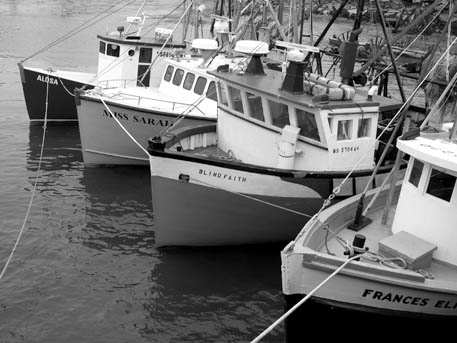
|
Citizens Help Researchers Learn About Fishing Communities
For the past two years, Hall-Arber, Rutgers University professor Bonnie McCay, and Massachusetts Fishermen Partnership executive director David Bergeron have been working on the community panels project, an effort to institutionalize social science data collection. Funded by the Northeast Consortium and Saltonstall-Kennedy grants, the project aims to delve deeply into fishing communities by enlisting community members to act as interviewers and information gatherers. The precursor to this project was an extensive study that identified New England fishing communities and their dependency on fishing. "We were all academics with the exception of one, and we really wanted to link up with people from fishing communities to have them review what was written in the book [resulting from the study] and to see what they thought was missing. Perhaps more importantly, we wanted the communities and industry to learn how to identify what issues most concern them today and in the future," says Hall-Arber. The research comes at a pivotal time, as regulators and fishermen grapple with how to protect fish stocks while preserving the fishing economy. The pending proposal for managing New Englandís groundfish, known as Amendment 13, is required under a Federal Court order to be implemented on May 1 of this year. The project initially focused on Gloucester, Mass., Scituate, Mass. and Beals Island, Maine, then expanded to include Portland, Maine, New Bedford, Mass., and Pt. Judith, R.I. In each area, a community member acts as a coordinator. Panel meetings, which function much like focus groups, are being held in each community, and coordinators then conduct individual interviews with harvesters, processors, and other shoreside businesses. While initial plans had called for around 10 people per panel, some infrastructure panels had up to 30, and an economics panel pulled in 50 participants for several meetings. "What is really different, using community members as coordinators, is that the people being interviewed may be more willing to open up," says Hall-Arber. "When you have community members involved in the project, there is a sense of ownership that evolves." In Gloucester, community members noted that they "had one of everything that they needed," but with the tightening of regulations, especially with groundfish, they noted fear that some businesses would fail, setting off a domino effect," says Hall-Arber. She notes that one N.H. fisherman who participated in the Gloucester panel stated that if he couldnít get all the supplies he needed in Gloucester, he would just continue down to New Bedford. In Pt. Judith, difficulty getting boat insurance was cited as a major concern. Many of the fleet's boats are 30-50 years old and some are wooden. According to Hall-Arber, many owners have put off maintenance, which potentially leads to accidents and more insurance claims. In addition, 9/11 and stock market losses mean that insurance companies are less willing to write policies for commercial fishing. Fishermen are also increasing their risks by fishing alone when they can't afford to pay crew. Another recurring issue is the aging of the fleetónot the age of the boats, but of the fishermen. One finding that surprised the researcher is the number of South Americans and Latin Americans coming into the fisheries, particularly in the processing plants. Many such workers are hired out of Lowell or Lawrence to work in Gloucester and New Bedford plants, with a few going out on boats. Hall-Arber suggests that this would continue a long tradition, with more immigrants going aboard as crew when opportunities become available. From the founding of the Gloucester fisheries by the English, through the growth of the modern fleet, Italians, Sicilians, Portuguese, and Norwegian immigrants have all contributed to New Englandís fishing industry. The Massachusetts panels were used in the summer of 2002 to help the Commonwealth decide how to allocate $5.5 million in emergency funds. "It was a little disheartening," says Hall-Arber. "Everyone said ëwe need more days at sea,í which we had no power over." Remuneration for captains and crew for some of the lost days at sea and reimbursement for gear suppliers for suddenly illegal nets were two of the identified priorities.
One important aspect to the project is that it helps the researchers demonstrate the cumulative impacts of years of increased regulations. Hall-Arber expects the reports for the three initial panels to be completed this summer, with the others out this fall. Those reports will go to NMFS, the New England Fisheries Management Council, the communities, and their government offices.
Marciano is one of two New England fishermen working on a project headed by Cliff Goudey, MIT Sea Grantís director of the Center for Fisheries Engineering Research. "When Dave sent me an email that evening after his sinking, I was stunned. We can replace lost instruments, but Dave has been a great collaborator. It's discomforting realizing the hazards he faces when he leaves the dock." Marciano has since bought another boatóa decision also affected by regulations. "I bought a 35-year-old wooden boat, which is older than my other boat," which was paid off, he says. "The next logical step would be to upgrade, but you canít justify that type of mortgage," he explains, given the decreased number of days at sea. "From 120 it went down to 88, then to 70," he says, adding that on May 1 of this year his days will drop to 52. "How can you make a 10-year plan when we've lost almost half of our days at sea per year?"
|
